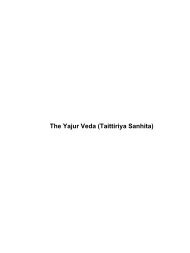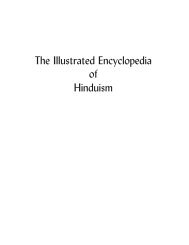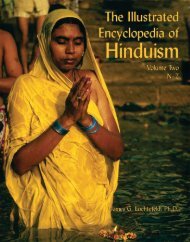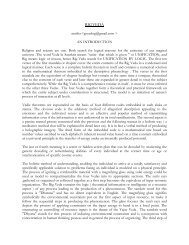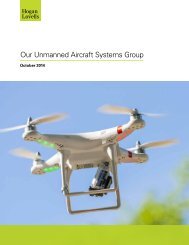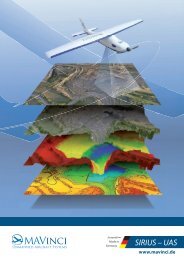A Concise Encyclopedia of Hinduism Klaus K Klostermaie
Create successful ePaper yourself
Turn your PDF publications into a flip-book with our unique Google optimized e-Paper software.
näga 124<br />
näga (2)<br />
Naked ascetics, quite <strong>of</strong>ten militant.<br />
Naimi•a<br />
A forest near the Gomatï river, in<br />
which, according to tradition, the<br />
Mahäbhärata was first recited to the<br />
assembled sages by the Süta (a traditional<br />
narrator).<br />
Nai•kärmya-siddhi<br />
Treatise by SUREŸVARA, a disciple <strong>of</strong><br />
ŸA¢KARA (2), which expounds the final<br />
truth (siddhi) <strong>of</strong> ADVAITA VEDÄNTA.<br />
naivedya<br />
The <strong>of</strong>fering <strong>of</strong> cooked food during the<br />
daily mürti-püjä (IMAGE worship).<br />
nak•atra<br />
Constellation or lunar mansion, the<br />
position <strong>of</strong> the moon within one <strong>of</strong> the<br />
27 or 28 parts into which astronomers<br />
divided the zodiac belt. The moon is<br />
seen in a different mansion each day.<br />
For ASTROLOGERS the position <strong>of</strong> the<br />
moon in a specific nak•atra is the basis<br />
for all prognostications. They are personified<br />
as daughters <strong>of</strong> Dak•a married<br />
to the moon.<br />
Nakula<br />
The fourth <strong>of</strong> the Päæõava brothers, son<br />
<strong>of</strong> MÄDRÏ, famous for his skill with<br />
horses. (See also MAHÄBHÄRATA.)<br />
Näm(a)dev(a) (1270–1350)<br />
Mahärä•flrian poet-saint, born in<br />
Pandharpur, a centre <strong>of</strong> Vi•æu worship,<br />
into a low-caste family <strong>of</strong> tailors. Converted<br />
from a dissolute life by<br />
JÑÄNEŸVARA to the worship <strong>of</strong> VIfifiHOBÄ,<br />
together with twelve members <strong>of</strong> his<br />
family, he composed a very large number<br />
<strong>of</strong> abhaögs (HYMNS), which are still<br />
used in worship at Pandharpur.<br />
näma–rüpa (‘name and form’)<br />
It is said that in the beginning ‘reality’<br />
was one and undifferentiated: there<br />
were no specific things and no manifestation<br />
<strong>of</strong> anything. By obtaining ‘name’<br />
and ‘form’, individual entities emerged<br />
and became manifest. Subsequently the<br />
expression näma–rüpa was used by<br />
Indian philosophers as a shorthand for<br />
finiteness, individuality and particularity.<br />
Näma–rüpa constitutes an entity as<br />
object, as opposed to consciousness as<br />
subject.<br />
Nambüd(i)ris<br />
The highest caste <strong>of</strong> BRÄHMAŒAS (2)<br />
(brahmins) in Kerala, <strong>of</strong>ten referred to<br />
as exemplars <strong>of</strong> CASTE consciousness; in<br />
former times a NAYAR had to precede a<br />
Nambüdri when he left his house, and<br />
announce his coming, to make sure that<br />
no OUTCASTE was in sight, because a<br />
mere glimpse would pollute him.<br />
name<br />
Names are considered the expression <strong>of</strong><br />
the people bearing them. Names and<br />
name giving are consequently very<br />
important in Hindu traditions. Hindu<br />
parents are advised, when naming a<br />
child, to chose a name that is pleasant to<br />
hear, auspicious in meaning, and appropriate<br />
for their station. The revealed<br />
names <strong>of</strong> God are believed to be identical<br />
to the divine essence: ‘taking the<br />
name’ is the equivalent <strong>of</strong> entering religious<br />
life, and repeating the name<br />
(näma-japa) is one <strong>of</strong> the most common<br />
religious exercises. There are litanies <strong>of</strong><br />
a thousand names (Sahasra näma) <strong>of</strong><br />
the major deities that are recited by the<br />
devotees.<br />
Nammävär (ninth century?)<br />
(‘our saint’)<br />
Also known as Ÿathakopa, he is considered<br />
the greatest among the Ä®VÄRS. He




